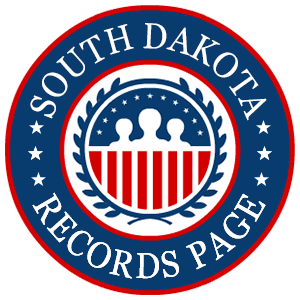Look up free South Dakota criminal records today to find information on loved ones that may be languishing in prison or verifying employment eligibility.
Whatever the reason may be, accessing South Dakota arrest records and other crime details is made possible due to the South Dakota Sunshine Law which has been updated to align with many of the stipulations contained in the Freedom of Information Act (FOIA).
However, criminal and arrest records are spread over several law enforcement agencies, courts and jurisdictions and this makes accessing them more difficult than it should be.
This resource serves to solve that problem by empowering citizens with the know-how and agencies to check with so information on anyone can be found.
Accessibility to Criminal & Arrest Records in South Dakota
South Dakota criminal and arrest records collectively known as rap sheets are available for the public to view pursuant to the South Dakota Sunshine Law (SDCL § Chapter 1-27)—this law is a series of laws that guarantees access to public records including criminal records from government agencies regardless of their physical form.1
Anyone can access criminal and current arrest records in South Dakota—a statement of purpose is not required, and neither are there any restrictions in place on their use. Unlike some other states, there is no specified response time mandated on government agencies to produce these records. Not all records are available for public consumption, including:
- Juvenile court records
- Medical research
- Adoption records
The South Dakota Sunshine Law borrowed many of its stipulations from the Freedom of Information Act (FOIA), which is a federal law that has a set of overarching laws allowing U.S citizens and residents to view federal records and documents produced with exemptions such as trade secrets, law enforcement records and medical files.2
Furthermore, these laws extend to other types of information such as marital status, court documents, property records and more — all of which are detailed in the instructions for South Dakota public record searches.
The Difference Between Criminal Records vs Arrest Records Searches in South Dakota
Criminal and arrest records in South Dakota have some marked differences due to the circumstances that produce them.
Generally, criminal records are created as a result of interactions of citizens with law enforcement and their subsequent dealings with the courts where their charges are heard in which they either receive a dismissal or conviction—they will include records such as disposition dates and dates of conviction.
In South Dakota, an arrest report is produced when offenders are taken into custody by law enforcement agencies on suspicions of crimes; they do have charges, but these have not been adjudicated by the courts yet and will include information such as the arresting agency and bond amount.
Criminal records include but are not limited to:
- Full names
- Date of birth (DOB)
- Age
- Sex
- Race
- Case numbers
- Court information
- Addresses (former and present)
- Type of conviction
- Guilty pleas, if any
- Date of conviction
- Charges of the court (felony or misdemeanor charge)
- Date of release
- Mug shot (photograph)
- Former arrest records
- Date of disposition
Arrest Records generally consist of:
- Names of the arrested individual
- Booking number
- Court case number
- Age
- Height
- Weight
- Race
- Address
- Gender
- Arresting agency
- Date of arrest
- Arrest location
- Cell Number
- Charges
- Warrant information
- Severity of the charge
- Bail amount
- Scheduled release date
How To Find Recent Arrests & Why Someone Is in a South Dakota Jail for Free
Citizens who may be concerned about missing loved ones or trying to locate a friend who’s in jail can begin their search through a number of multiple avenues.
This includes looking through county sheriff’s offices, city jail police departments and, in some instances, county courts. It should be stated that court records are typically not a viable way to find recent arrests.
Generally, county sheriff’s offices and city police departments have online databases that can be utilized to find out if someone was arrested for free or at a nominal cost if copies of records are required.
Perform a South Dakota Arrest Record & Mugshot Search via County Sheriff Offices
South Dakota has 66 counties, all of which have a sheriff’s office that can be contacted to obtain South Dakota arrest records for arrests that have taken place in a county. A handful of county sheriff’s offices in South Dakota have online rosters that provide a free and quick way to find out what someone was arrested for.
These online rosters will sometimes have photographs of offenders drawn from a mugshot database created during the booking of offenders.
In cases where there are no online rosters, members of the public can either visit or call sheriff’s offices to find daily arrests.
This table can be used to find out someone’s charges in jail in all counties in South Dakota. Links point to inmate detainment lists—in cases where one is not available, the link will be marked with a (*). This will instead be directed to the sheriff’s office contact.
There is also a column that displays whether a mugshot is available for viewing or not:
The County Sheriff’s Offices without links do not have an online presence.
Look Up Recent Arrests in City Jails Throughout SD
In addition to finding recent arrests in county jails, sometimes inmates can be found by contacting cities that have police departments with jails.
Some city jails like county jails may have online rosters that can be used to find out if someone is in jail, however this is not the case in South Dakota where requesters must either call or visit the local city jails. An example of a city police department that has a jail is The Pierre Police Department located in the city of Pierre.
How To Contact Someone in Jail & Bail Them Out (South Dakota Bail Process)
South Dakota jails provide a way for members of family and friends to contact inmates in jail and also provide a way for them to bail them out when a bond amount has been set.
Contacting an Inmate
While county jails will allow for varying ways to contact the inmates located in their jails, there are 3 ways that they typically allow for contacting:
- Through in-person visitations
- By allowing inmates to send and receive calls.
- Through mail that can be sent and received by inmates.
In-Person Visitations—The majority of jails will allow some form of in-person visitations and will restrict this to certain days of the week while also limiting the duration of the visits. There are particular rules that will apply to these visitations, such as:
- Dress code
- Photo identification requirements
- Age minimum for visitors
- Obscene and disorderly behavior prohibited, etc.
Phone Calls—County jails such as the one located in Davison County allow inmates daily access to a phone that allows for “Collect Calls” where the person receiving the call is charged.
Mail—Some jails may allow inmates to send and receive mail which must be inspected before delivered to the inmate.
Members of the public should contact the jail where the offender is housed to determine what their policies are for communicating with inmates and what kind of communication is allowed.
Bailing Out an Inmate
When offenders are in custody after being charged with an alleged offense, the judge may determine a bail amount subject to the severity of the crime committed—the defendant can choose to pay this amount in one of two ways in South Dakota:
- Paying the Bail Money—The defendant can choose to pay the full amount of bail money in cash in order to get out of jail.
- Having a Bond Posted—This option is taken by majority of defendants due to the bail amount being too high and involved enlisting a professional surety bondsperson. The bail bond company is in the business for profit and will typically charge the defendant 10%-20% of the total bond amount which is nonrefundable.
The defendant will be on contract with the company to attend all court hearings as they work to pay the full amount. This list details licensed Active Bail Bonds Producers in South Dakota and the zip codes they operate in.3
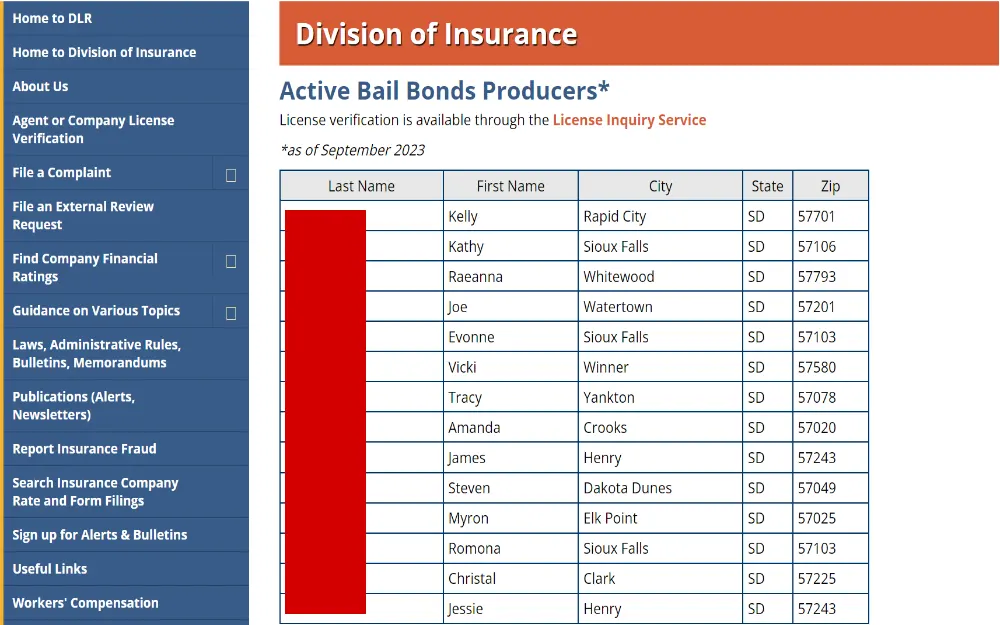
While the 8th amendment of the U.S. constitution bars excessive bail amounts, it does not mandate courts to grant bail—moreover, bail should not be looked at as a sanction, but rather a form of collateral that binds the defendant to abide by certain conditions and attend court hearings.4
Failure to attend court will result in revocation and loss of the bail amount and will result in a judge issuing a bench warrant arrest that could lead to fines and jail time notwithstanding the current pending charges.5
Ways To Look Up South Dakota Criminal Records
Citizens can retrieve copies of South Dakota criminal records from multiple sources, including local, state and federal agencies. These government agencies provide viable sources for copies of criminal records at little or no cost and will be discussed further in the sections below:
- The South Dakota Division of Criminal Investigation
- Public Access to Court Electronic Records (PACER) is a public index used to locate appellate court and federal records and records
- Requesters can also obtain criminal records through county courts that have information on ongoing court cases through the South Dakota Unified Judicial System
- Performing a national background check through the Federal Bureau of Investigation (FBI)
Access Criminal Records via the County Court Case Access or Clerk of Court (South Dakota)
Court records can be accessed by members of the public due to the state’s South Dakota Sunshine Law and the Court Records Rule that mandates that court records be made accessible to the public—this can either be completed through the clerk of court or the South Dakota Unified Judicial System.6, 7
Steps To Perform a Criminal Record Search via the Clerk of the Court
To locate criminal records in a county court, view the Court Finder Search Tool or use the table below to obtain the contact information.
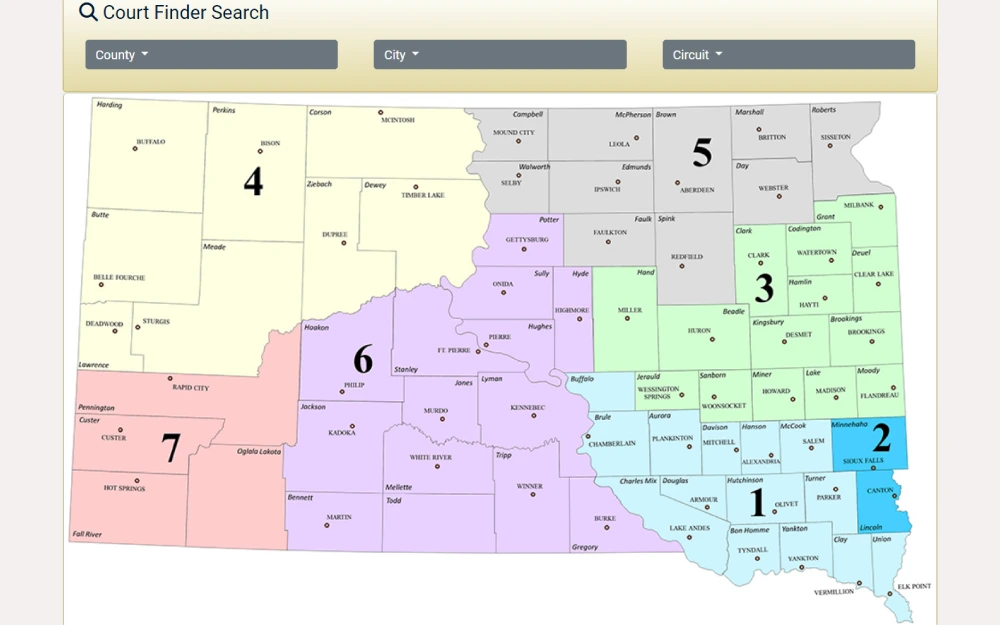
Court records can be accessed either through:
- In-Person—Requesters can visit the court of concern and submit a record request to the clerk of the court. Citizens may also obtain details of court records from the State Supreme Court Building located at:
- South Dakota Supreme Court
500 East Capitol Avenue,
SD 57501
- South Dakota Supreme Court
- Mail—Request can be mailed to the Court Administrator including a $20 payment.
- Online—Visit the South Dakota Unified Judicial System website and upload the Record Inquiry & Search Request Form to either perform a statewide or county search both of which cost $20 each.
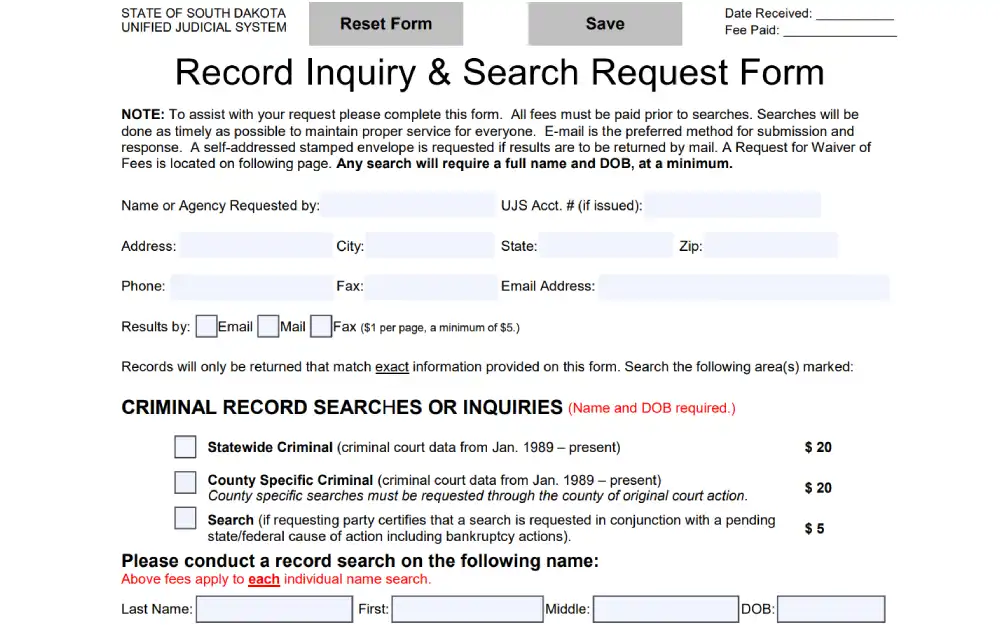
There is a second online method which utilizes the state’s Public Access Record Search which can be used either with login credentials or as a guest.8 This also costs $20 per record search and payment can be made via credit card.
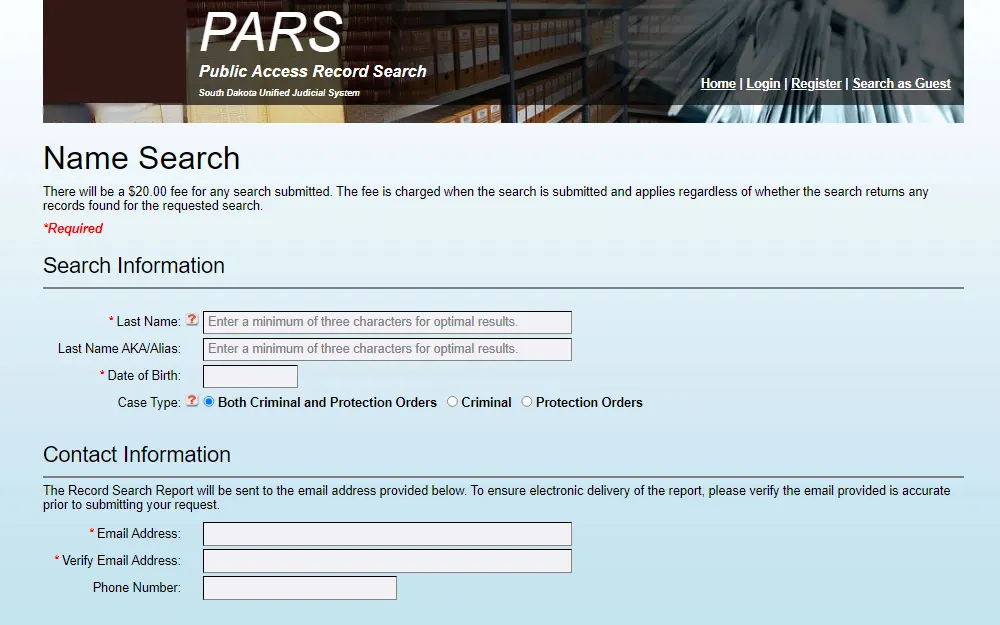
The table below contains addresses and telephone contacts for all county courthouses in the state of South Dakota. Using this information will allow for court record requests that can be done either by mail or by paying a visit to the clerk of the court:
| County | County Courthouse Address | Phone Number |
| Aurora County | 401 North Main St. Plankinton, SD 57368 |
(605)942-7165 |
| Beadle County | 450 3rd Street SW Huron, SD 57350 |
(605)353-7165 |
| Bennett County | 205 State St. Martin, SD 57551 |
(605)685-6969 |
| Bon Homme County | 300 West 18th Ave. Tyndall, SD 57066 |
(605)589-4215 |
| Brookings County | 314 6th Ave. Suite 6 Brookings, SD 57006-2085 |
(605)688-4200 |
| Brown County | 101 1st Ave. SE Suite 200 Aberdeen, SD 57402 |
(605)626-2451 |
| Brule County | 300 S. Courtland #111 Chamberlain, SD 57325 |
(605)734-4580 |
| Buffalo County | 300 S. Courtland #111 Chamberlain, SD 57325 |
(605)734-4580 |
| Butte County | 839 5th Ave. Belle Fourche, SD 57717 |
(605)892-2516 |
| Campbell County | 111 2nd St. NE Mound City, SD 57646 |
(605)955-3536 |
| Charles Mix County | 400 E. Main St. Lake Andes, SD 57356 |
(605)487-7511 |
| Clark County | 200 N. Commercial St. Clark, SD 57225 |
(605)532-5851 |
| Clay County | 211 W. Main St. Vermillion, SD 57069 |
(605)677-6756 |
| Codington County | 14 1st Ave. SE Watertown, SD 57201 |
(605)882-5095 |
| Corson County | 212 1st Ave. E. McIntosh, SD 57641 |
(605)273-4201 |
| Custer County | 420 Mt. Rushmore Road, Suite 6 Custer, SD 57730 |
(605)673-4816 |
| Davison County | 200 E. 4th St. Mitchell, SD 57301 |
(605)995-8105 |
| Day County | 711 W. 1st St. #201 Webster, SD 57274 |
(605)345-3771 |
| Deuel County | 408 4th St. Clear Lake, SD 57226 |
(605)874-2120 |
| Dewey County | 710 C St. Timber Lake, SD 57656 |
(605)865-3566 |
| Douglas County | 706 Braddock Armour, SD 57313 |
(605)724-2585 |
| Edmunds County | 210 2nd St. Ipswich, SD 57451 |
(605)426-6671 |
| Fall River County | 906 North River St. Hot Springs, SD 57747 |
(605)745-5131 |
| Faulk County | 110 9th Ave. Faulkton, SD 57438 |
(605)598-6223 |
| Grant County | 210 E. 5th Ave. Milbank, SD 57252 |
(605)432-5482 |
| Gregory County | 221 E. 8th St. Burke, SD 57523 |
(605)775-2665 |
| Haakon County | 140 S. Howard Philip, SD 57567 |
(605)859-2627 |
| Hamlin County | 350 4th St. #2 Hayti, SD 57241 |
(605)783-3751 |
| Hand County | 415 W. 1st Ave #11 Miller, SD 57362 |
(605)853-3337 |
| Hanson County | 440 Main St. Alexandria, SD 57311 |
(605)239-4446 |
| Harding County | 410 Ramsland St. Buffalo, SD 57720 |
(605)375-3351 |
| Hughes County | 104 E. Capital Ave. Pierre, SD 57501 |
(605)773-3713 |
| Hutchinson County | 140 Euclid, Room 36 Olivet, SD 57052 |
(605)387-4215 |
| Hyde County | 412 Commercial Ave. Highmore, SD 57345 |
(605)852-2512 |
| Jackson County | 1 Main St. S. Kadoka, SD 57543 |
(605)837-2122 |
| Jerauld County | 205 Wallace Ave. S. Wessington Springs, SD 57382 |
(605)539-1202 |
| Jones County | 310 Main St. Murdo, SD 57559-0448 |
(605)669-2361 |
| Kingsbury County | 202 2nd St. DeSmet, SD 57231 |
(605)854-3811 |
| Lake County | 200 East Center Madison, SD 57042 |
(605)256-5644 |
| Lawrence County | 90 Sherman St. Deadwood, SD 57732 |
(605)578-2040 |
| Lincoln County | 104 N. Main St. Canton, SD 57013 |
(605)987-5891 |
| Lyman County | 300 S. Maine St. Kennebec, SD 57544 |
(605)869-2277 |
| Marshall County | 911 Vander Horck St. Britton, SD 57430 |
(605)448-5213 |
| McCook County | 130 W. Essex Ave. Salem, SD 57058 |
(605)425-2781 |
| McPherson County | 706 Main St. Leola, SD 57456 |
(605)439-3361 |
| Meade County | 1425 Sherman St. Sturgis, SD 57785 |
(605)347-4411 |
| Mellette County | First & McKinley St. White River, SD 57579 |
(605)259-3230 |
| Miner County | N. Main St. & Park Ave. Howard, SD 57349 |
(605)772-4612 |
| Minnehaha County | 425 North Dakota Ave. Sioux Falls, SD 57104 |
(605)367-5900 |
| Moody County | 101 E. Pipestone Ave. Flandreau, SD 57028 |
(605)997-3181 |
| Oglala Lakota County | 906 North River St. Hot Springs, SD 57747 |
(605)745-5131 |
| Pennington County | 315 St. Joseph St. #5 Rapid City, SD 57709 |
(605)394-2575 |
| Perkins County | 100 E. Main St. Bison, SD 57620 |
(605)244-5626 |
| Potter County | 201 S. Exene St. Gettysburg, SD 57442 |
(605)765-9472 |
| Roberts County | 411 2nd Avenue E. Sisseton, SD 57262-1403 |
(605)698-3395 |
| Sanborn County | 604 W. 6th St. Woonsocket, SD 57385 |
(605)796-4515 |
| Spink County | 210 East 7th Ave. Redfield, SD 57469 |
(605)472-4535 |
| Stanley County | 8 E. 2nd Ave. Ft. Pierre, SD 57532 |
(605)223-7735 |
| Sully County | 700 Ash St. Onida, SD 57564 |
(605)258-2535 |
| Todd County | 200 E. 3rd Ave. Winner, SD 57580 |
(605)842-2266 |
| Tripp County | 200 E. 3rd Ave. Winner, SD 57580 |
(605)842-2266 |
| Turner County | 400 S. Main Ave. Parker, SD 57053 |
(605)297-3115 |
| Union County | 209 E. Main St., Suite 230 Elk Point, SD 57025 |
(605)356-2132 |
| Walworth County | 4304 4th Ave. Selby, SD 57472 |
(605)649-7311 |
| Yankton County | 410 Walnut Street, Suite 205 Yankton, SD 57078 |
(605)668-3080 |
| Ziebach County | 601 Main St. Dupree, SD 57623 |
(605)365-5159 |
Find Criminal Records via South Dakota’s Unified Judicial System
South Dakota has a central record repository for court records spanning from its supreme court to the county district courts known as the South Dakota Unified Judicial System.
The database is free to use to perform a criminal record search in court records. However, a registration is required, but all information is kept confidential.
How To Retrieve a Copy of Criminal Records in South Dakota (SD)
Citizens may be required to get copies of criminal records to establish employment eligibility and/or ensure the safety of a community—they have several ways in which they can accomplish this, including:
- Obtaining copies of criminal records from the South Dakota Division of Criminal Investigation (SDDCI) Identification Department responsible for processing fingerprint based background checks.
- Copies of South Dakota arrest records can also be obtained from the South Dakota Unified Judicial System and Public Access Record Search, which retrieves court records—this was discussed earlier.
Obtain Criminal Record Reports Through the South Dakota Division of Criminal Investigation (SDDCI)
Background checks in SD are 100% fingerprint-based, and there are no name-based searches. This means that to perform a background check for someone else, a consent form is required. Background checks in SD are processed in 2 ways:
State-Only Background Checks—These background checks include those performed for certain employment and those done for personal reasons. They may also be done for someone else with consent.
State/FBI Background Checks—This type of background requires legislation and is conducted mostly for professions including but not limited to school employment, Board of Bar Examiners, Board of Nursing etc. This will be touched upon in the sections below.
State-Only Background Checks
These are completed for certain employment and for personal reasons. These steps should be taken to complete state-only background checks:
- Fingerprint kits may be obtained by calling the ID section at (605)773-3331.
- The fingerprint card must be completed in full, having the applicant’s name, DOB, gender and SSN as the required information.
- The authorization form (consent form) must be filled out and signed.
- The card must have a full set of prints as per SDCL § 23-5-12.9 This is to be done at a local law enforcement agency that may charge additional fees.
- Check or money order for $26.75 will need to be sent along with the fingerprint card and authorization form. Cash is not accepted.
- Upon receipt of all of the above, DCI will conduct a state search and provide copies of any South Dakota criminal records if available.
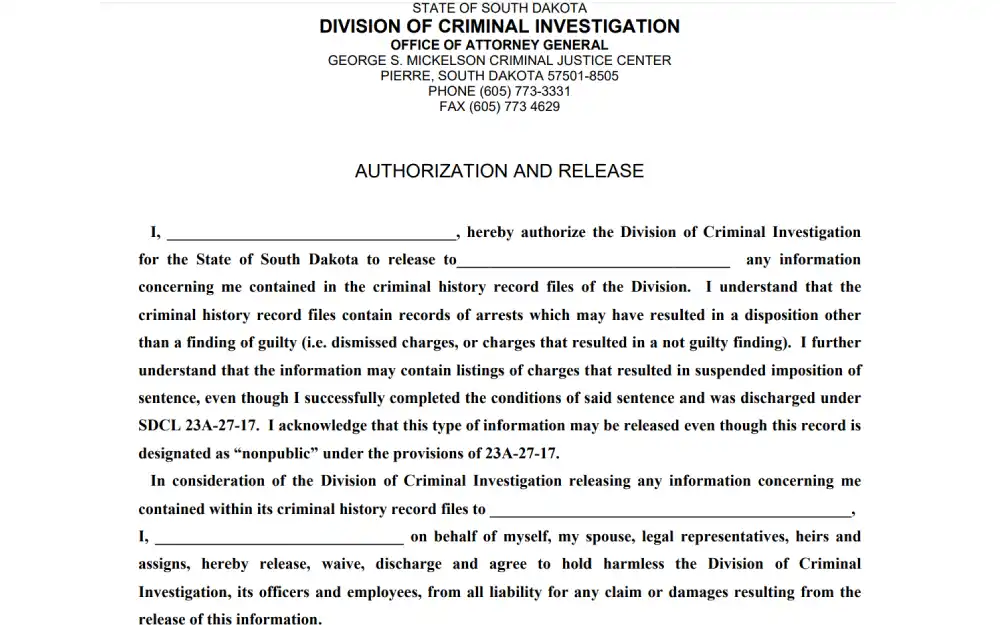
How To Tell if Someone Is on Probation or Parole in South Dakota
The Board of Pardons & Paroles under jurisdiction of the SD Department of Corrections (SDDOC) administers the granting of paroles and pardons to inmates in state prisons—the SDDOC is the point of contact to find out if someone is on parole in the state.10
Under South Dakota State laws, a parolee is an offender who has been conditionally released to parole or suspended sentence from a SDDOC facility before the expiration of their sentence under the supervision of the SD Department of Corrections.11
To illustrate just how many people are on probation and parole, the following image shows the combined total of probationers and parolees in South Dakota, along with their ethnicities. Furthermore, these totals are also compared to the number of individuals on community supervision (including probation and parole) in other states across the United States.
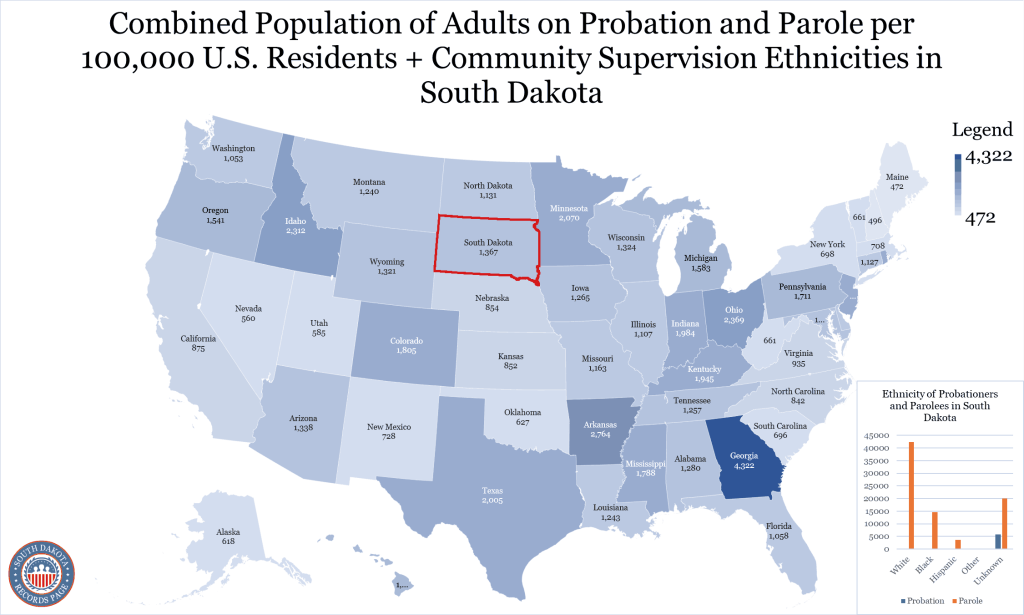
The SDDOC has an inmate locator tool and people finder, which is expounded upon in the section below when finding state offenders; this South Dakota Probation Search Tool can also be used to look up SD offenders on probation.
This parolee database can be queried using the following:
- South Dakota Department of Corrections number (SDDOC #)
- Last name
- First name
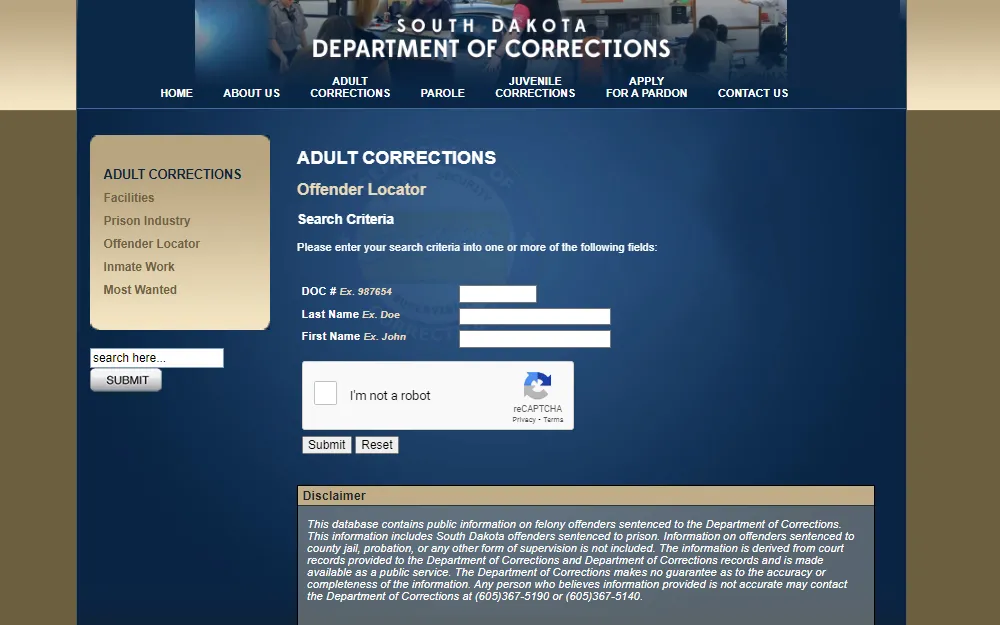
Searchers can also follow the steps for accessing South Dakota parolee details for helpful guidance.
How To Request Expunction of a Criminal Record in South Dakota
Expunging of criminal records is typically done through the courts and by the attorney general.
As per SDCL § 23A-3-26, expungement pertains to the sealing of all criminal records in the courts, law enforcement agencies, detention facilities or Department of Public Safety in regard to an individual’s arrest, detention, apprehension, trial or disposition of an offense committed within the criminal justice system.12
However, in South Dakota, an expunction does not result in the physical destruction of records but only the sealing of records.
Furthermore, as per SDCL § 23A-3-32, after an expunction, an individual’s status in the contemplation and eyes of the law is restored to the way it was before an arrest or indictment or information—they are therefore, can no longer be held guilty of the crime for which the expunction was completed.13
Additionally, and in pursuant to SDCL § 23A-3-34, charges and convictions that are non-felony and regarding petty offenses, misdemeanors and municipal ordinance violations will automatically be removed after 10 years once all court-ordered conditions on the case are met.14
Process of Expunction
There are 2 types of records that can be expunged:
- Arrest records that did not result in a conviction
- Records of criminal convictions
Removing Arrest Records: As per SDCL § 23A-3-27, arrested persons may apply for expunction at the court with jurisdiction of the crime:15
- One year after the arrest date
- Any time after the acquittal
- One year after the prosecutor makes a formal dismissal of the criminal case
Removing Criminal Convictions: Criminal convictions may be removed in multiple ways, including:
- Automatic removal discussed above, pursuant to SDCL § 23A-3-34.
- The SD Attorney General, who happens to be the Director of the Bureau of Criminal Statistics, could approve the expunction if:
- The person is dead.
- A person is 75 years or older, and the violation occurred within the last 10 years.
- Offenses that are no longer considered crimes under SD laws.
- Misdemeanor offenses whose final date of disposition has taken place at least 10 years before the destruction date that is authorized.
- Pardon granted by the Governor of South Dakota is known as an Executive Clemency. Online forms for this type of expunction can be located at the State of South Dakota’s Executive Clemency – Pardon.
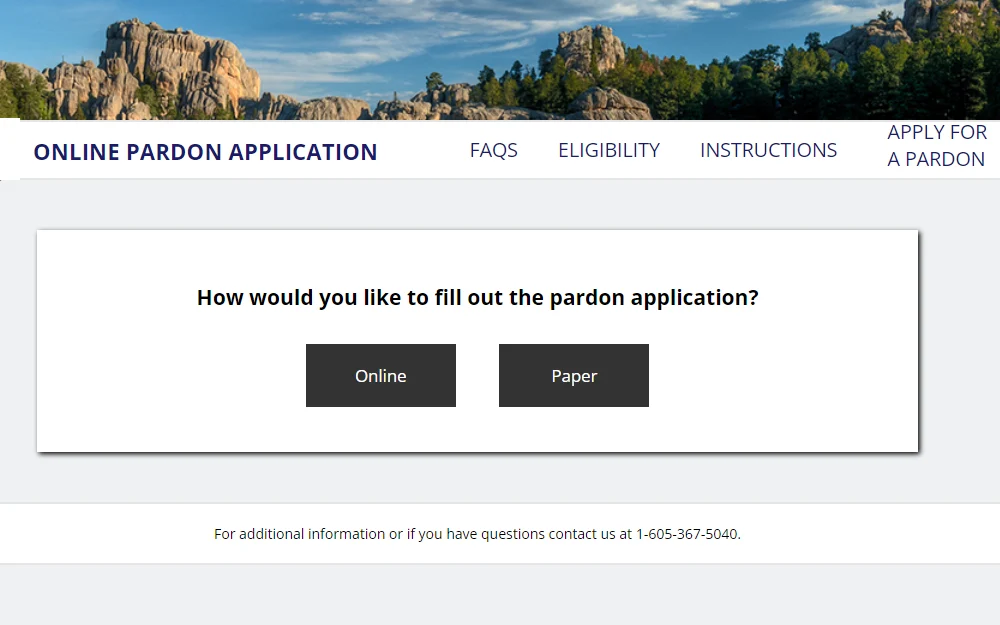
The motion for expungement instruction sheet can be found here and will be used for all the other petitions for expunction barring the one pertaining to the Governor.
The applicant shall make payment to the clerk of courts in the county where the motion is filed pursuant to SDCL § 23A-3-28, a fee equal to the filing fee for a civil action—this costs $70.16 This fee can be waived if there is a demonstrated financial hardship.
How To Find an Inmate in a State or Federal Prison in South Dakota
There are 6 state prisons located in South Dakota with an approximate prison population of about 3,250 and one minimum security federal prison camp located in Yankton, SD—members of the public who are looking to locate inmates housed in South Dakota correctional facilities should contact the South Dakota Department of Corrections (SDDOC) and Federal Bureau of Prisons (BOP) respectively.17
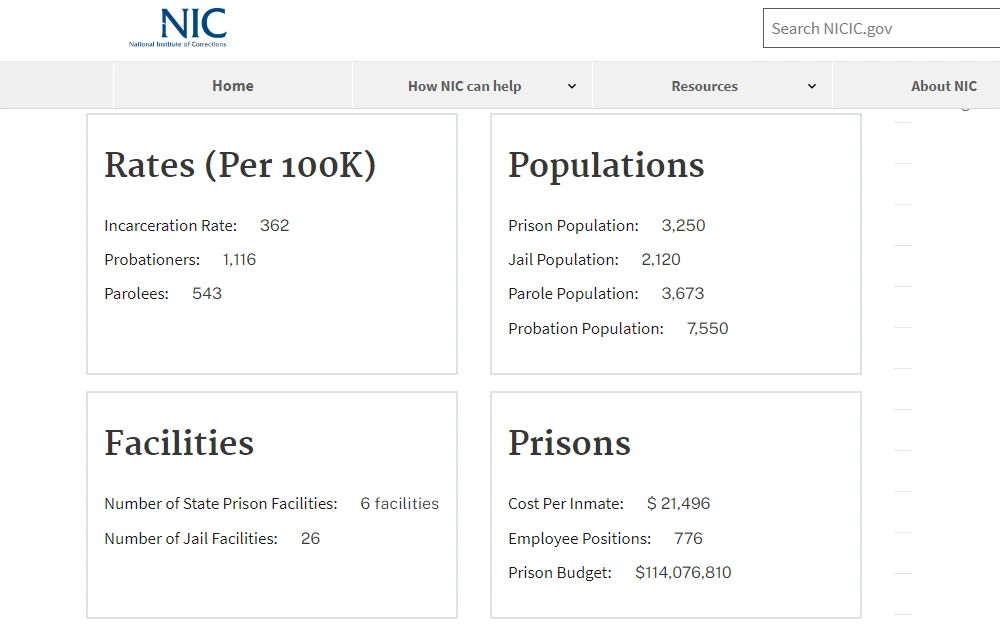
Federal Prison Search:
The Federal Bureau of Prisons (BOP) has a public records repository online for federal inmates located throughout the nation—this is accessed using a Federal Prison Inmate Locator tool that can be utilized to find federal inmates.18
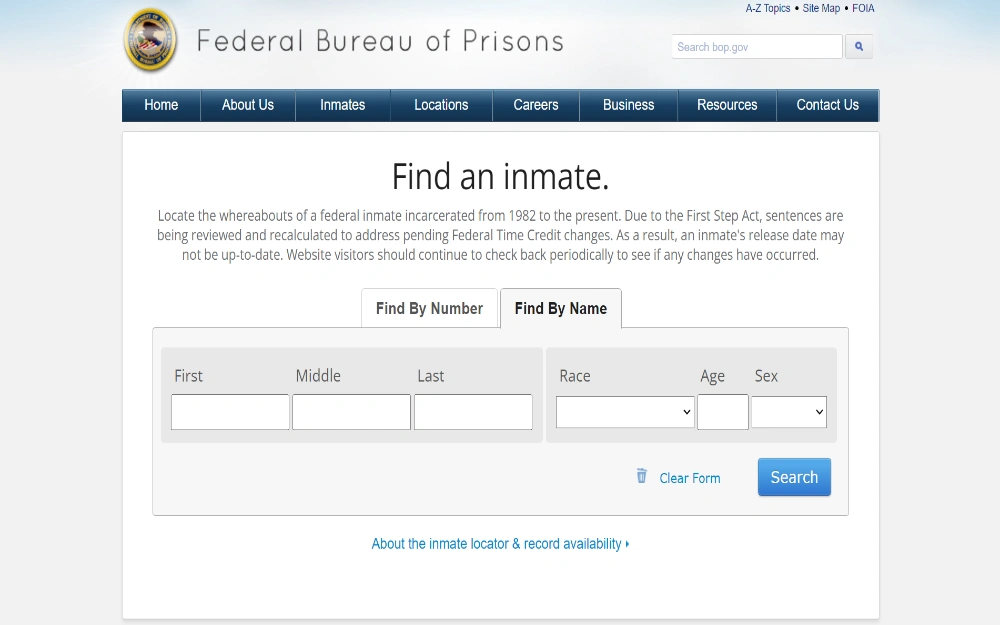
South Dakota State Prison Search:
The South Dakota Department of Corrections (SDDOC) maintains jurisdiction over South Dakota’s 6 state prisons and maintains an online directory of these prisoners which can be queried using the South Dakota State Prisoner Search Tool.
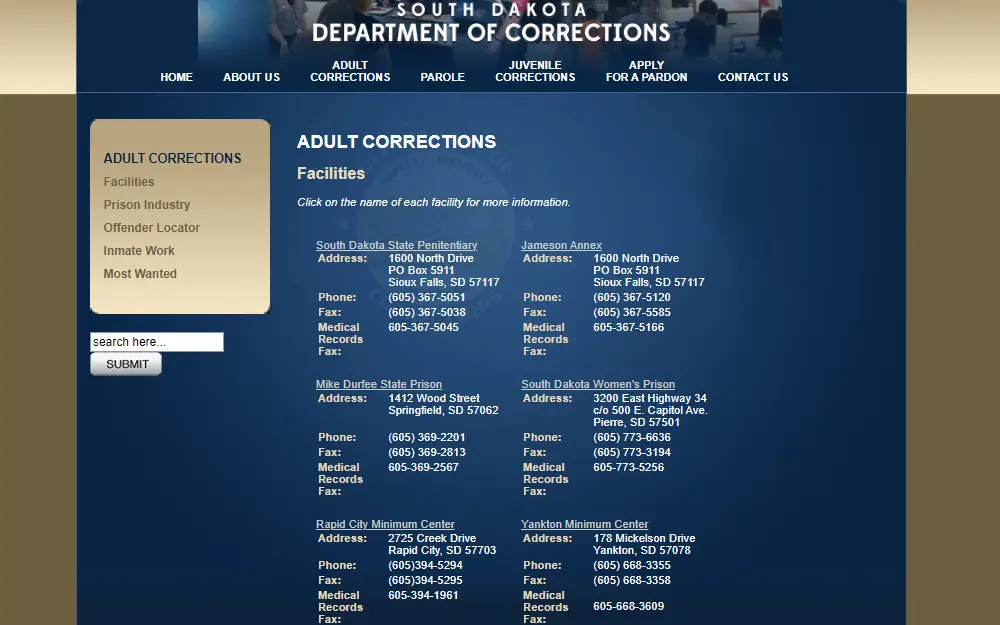
The tool can be queried using:
- South Dakota Department of Corrections number (SDDOC #)
- Last name
- First name
How To Perform a Warrant Search On Yourself or Someone Else in South Dakota
Obtaining South Dakota warrant information can conveniently be done through multiple avenues, including:
- Querying county sheriff’s offices and city police departments.
- The SDDOC can also be searched to find warrants.
- Court records may have warrant lists.
- Background searches through the South Dakota Division of Criminal Investigations.
- Through the U.S. Marshall’s service.
- Third-party vendors.
Warrant Search Through the County Sheriff’s Offices: A number of county sheriff’s offices will have online warrant lists. In cases where they don’t have these lists, interested individuals should either call or visit the respective police departments.
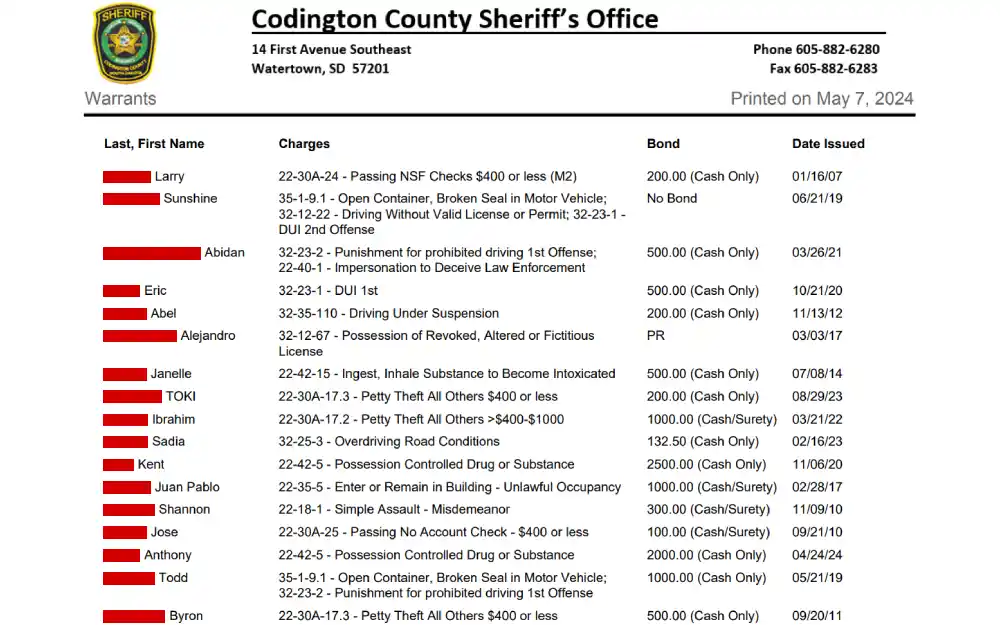
Warrant Search Through the SDDOC: The SDDOC has a Most Wanted List that can be scoured to find people who are wanted—this includes:
- Parole absconders
- Escapees & walkaways
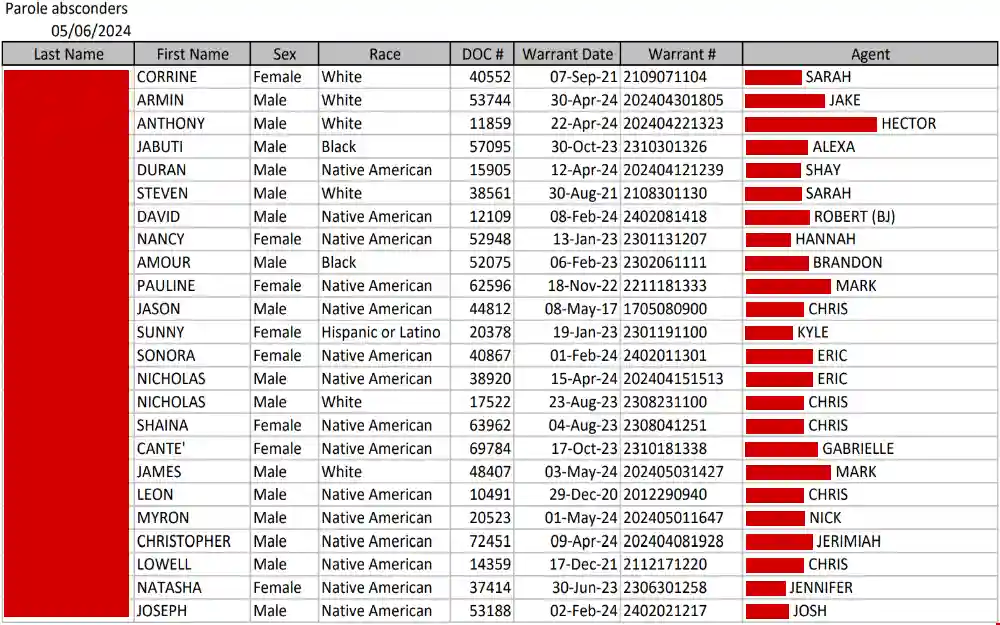
Warrant Search Through County Courts: Warrants are typically issued by the courts, and as such, those interested in knowing if there is a warrant out for their arrest could use the Court Docket Database Search Tool. This was discussed in the previous section when locating criminal records in the courts.
Warrant Search via the South Dakota Division of Criminal Investigations: When performing background checks through the South Dakota Division of Criminal Investigation (SDDCI), citizens will be able to make a determination for any outstanding and/or active warrants.
Background searches in South Dakota are 100% finger print-based and will require the use of a consent form when being done for someone else. The process of conducting background searches through the SDDCI will be discussed in the section below.
Warrant Search Through the U.S. Marshall Services: This avenue provides a way of finding federal fugitives with warrants and/or state fugitives who may have active warrants.

Warrant Search Through Third-Party Vendors: Third-party vendors may be sought when looking to find out if there is a warrant on someone.
They do this for a charge and make the process easier, since they provide a one stop shop to search several government entities simultaneously. Third party vendors do provide some sort of privacy but may also sometimes fail to be accurate as they are not the actual government agencies.
A Summary of SD Background Checks
Certain professional bodies in South Dakota, such as municipalities, schools, boards of nursing etc., require several professions, such as caregivers, doctors and volunteers, to complete background screenings to ensure they don’t possess South Dakota criminal records.
Many occupations that require state licensing, such as real estate appraisers, are mandated to obtain background checks.
These background checks are essential to ensure that citizens receive the highest quality of service whilst also safeguarding communities by preventing unethical persons from supervising vulnerable members of society including minors and the elderly.
This below table merely gives some insight on the different agencies that require background checks for professions that fall under their umbrella—however, there are additional agencies and other professions that will require these checks and are not mentioned in this list:
| Agencies That Requires a Background Check in South Dakota | Screening Reasons |
| South Dakota Department of Education |
|
| South Dakota Department of Human Services |
|
| South Dakota Department of Social Services |
|
| South Dakota Department of Health |
|
| South Dakota Department of Labor & Regulation |
|
Since South Dakota only performs finger print based searches through the South Dakota Division of Criminal Investigation (SDDCI), it is not possible to do backgrounds for someone else through them without consent from the subject of the record.
All background checks that are performed for employment purposes must be subject to South Dakota laws, and guidelines set forth by the Fair Credit and Reporting Act (FCRA) and the Equal Employment Opportunity Commission (EEOC).
The EEOC does not allow employers to conduct and the information derived from these checks to undermine equal employment opportunity to job applicants. The FCRA on the other hand mandates that employers obtain a written authorization to conduct background checks from potential employees.
Additionally, the FCRA has mandates that enable employees to view their criminal background history information. By doing so, they have a chance to correct any mistakes and appeal any decisions that have been made due to the results of the checks.
Professional bodies like those outlined above will conduct State/FBI background checks in South Dakota, as these types of checks require legislation.19
State & FBI Background Checks
State/FBI background checks are done for the professions listed in the table above, as mentioned before. The procedure for completing State/FBI background checks is similar to that of state-only background checks, with the exception of the type of fingerprint cards used and the fees.
- In addition to the state fingerprint card, a special FBI fingerprint card is used and will have a pre-printed ORI (Originating Agency Identifier) assigned to the FBI—this fingerprinting would indicate that the search for employment is pursuant to its SDCL.
- The fingerprinting will also be done at law enforcement agencies.
- The total payment will be $43.25 in the form of a check or money enclosed with the authorization form and fingerprint cards. The FBI charge is $19.25 for each request and DCI charges $24 for each request.
- Upon receipt, both the DCI and FBI (the DCI forwards the request to the FBI) will conduct searches, and if there is a criminal history, a copy of the criminal history record will be returned. If there is no record, a response sheet will be returned.
How To Locate Nearby Predators Using the South Dakota Sex Offender Registry
The Office of the Attorney General – Division of Criminal Investigation in South Dakota is mandated to maintain a sex offender registry that citizens can have access to, pursuant to SDCL § 22-24B-10.20
This law makes persons convicted of sex offenses liable to register with the state and all their bio data becomes public information with the exception of social security numbers (SSN’s), DNA samples, next of kin contact information etc.
To access this felony registry for sex offenders, citizens can proceed to the Sex Offender Registry Search Tool, which can be queried using 2 criteria, namely:
- Text Search—The text search finds offenders using the last name, first name, alias, city, county and zip code.
- Neighborhood Search—This search involves locating an offender within a certain radius of an address provided.
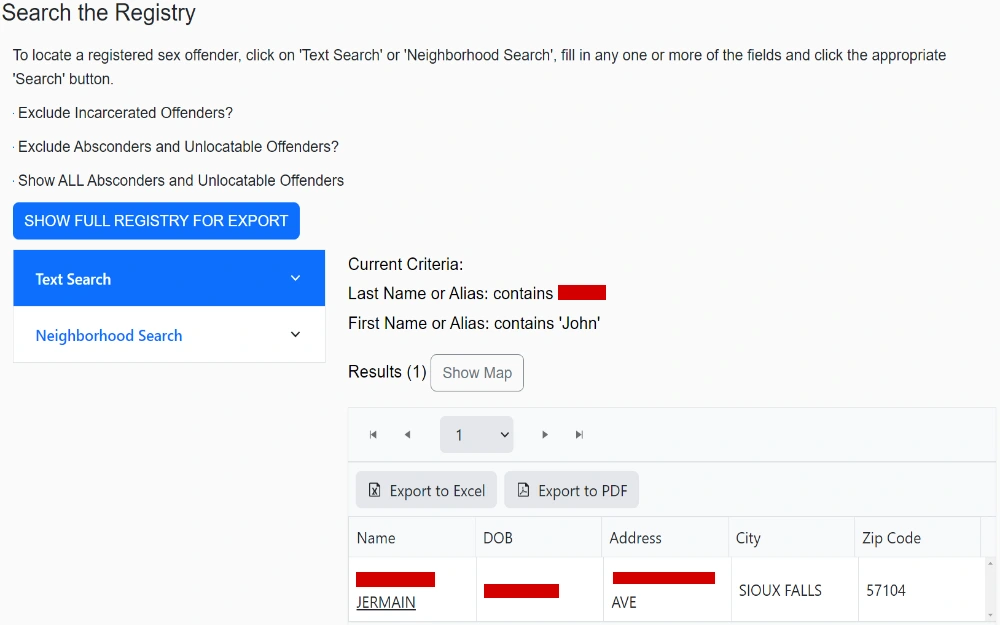
Citizens Rights When Accessing Criminal Records & Arrest Records Under South Dakota Laws
South Dakota’s Sunshine Law (SDCL § Chapter 1-27) and the Freedom for Information Act (FOIA) allows it to be an open records state which facilitates criminal and arrest records to be made available for public consumption. There are however several laws that ensure privacy rights are upheld resulting in the restriction of access to certain criminal records.
These statutes applied include the Fair Credit Reporting Act’s (FCRA) Summary of Rights and the Employment Opportunity Commission’s (EEOC) Employee Rights.
FCRA—The FCRA mandates that consumer reporting agencies do not report an individual’s criminal history within the last 7 years. These laws vary from state to state in terms of the look-back periods. It should be stated that no time limit exists on the reporting of criminal histories when the job being applied for pays more than $75,000 annually in South Dakota.21
EEOC—Criminal convictions will still show in a background check with the exception of sealed criminal records. If an employer rejects an applicant due to a criminal conviction that happened years before the application, they may find themselves violating EEOC laws.
The EEOC laws are designed to protect the rights of employees and thus prevent discrimination against employees. Additionally, employers have to evaluate the relevance of an applicant’s criminal history and how it relates to the role of a job–they should typically make the following considerations:22
- Nature of the crimes on record.
- Time since the offense has passed.
- Nature of the job.
Also, employers should not refuse to hire someone simply because they got arrested as this is not proof they were convicted of a crime.
Expunction—In South Dakota, when criminal records are expunged, they are not deleted nor destroyed but instead are sealed and no longer available to the public to view, pursuant to SDCL § 23A-3-32. Therefore, job applicants are not required to disclose this information to prospective employers. South Dakota arrest records that do not produce convictions and criminal records can be expunged under certain conditions.
Certain criminal records, such as petty offenses and misdemeanors, are automatically expunged after 10 years once the terms of the courts have been satisfied pursuant to SDCL § 23A-3-34. Moreover, expunctions are generally done through the courts, but some can be done by the Attorney General. Additionally, the governor may pardon some criminal records.
Juvenile Records—Pursuant to SDCL § 26-7A-35, South Dakota makes it unlawful to disclose juvenile arrest and detention, which may be identifying information such as names, photographs or addresses; these can only be retrieved via court order.23
In addition, these otherwise restricted access criminal records, whether juvenile and/or expunctions, can still be accessed by law enforcement agencies, magistrates and prosecutors.
Ban the Box Laws—South Dakota does not have a ban the box law for public and private employees. It does however follow the provisions set forth by the FCRA and Title VII that prevents the discrimination in the workplace based on color, sex, national origin, religion and race.
Ban the box laws make it such that job applicants are first judged by their credentials excluding any criminal records they may possess. This is because employers cannot ask job applicants about their criminal history during the application process. Rather, this is reserved for later, during the advanced parts of the hiring process.
Running personal criminal background checks without someone’s consent is prohibited in South Dakota through the South Dakota Division of Criminal Investigation (SDDCI) primarily because this government entity conducts 100% fingerprint-based checks. Nevertheless, it is possible to perform criminal record checks for other persons through the sheriff’s offices, county courts and 3rd party vendors for other persons.
Background checks that are being completed for professional purposes such as employment, property management, licensing etc., must conform to federal and state laws such as those requiring consent from the subject of the record.
South Dakota criminal records are available through multiple government agencies including county sheriff’s offices, courts and the Department of Criminal Investigation which may make maneuvering through these entities cumbersome and time consuming.
Having the right road map can make the process of finding South Dakota arrest records seamless, including criminal proceedings, without regard to the county where someone was arrested or convicted.
References
1Legislature, S. D. (2023). CHAPTER 1-27 – PUBLIC RECORDS AND FILES. Retrieved 2023, from <https://sdlegislature.gov/Statutes/1-27>
2State, U. D. (2023). The Freedom of Information Act. Retrieved 2023, from <https://foia.state.gov/learn/foia.aspx>
3Regulation, S. D. (2023). Division of Insurance. Retrieved 2023, from <https://dlr.sd.gov/insurance/bail_bonds/active_bail_bond.aspx>
4School, C. L. (2022, January 1). excessive bail. Retrieved 2023, from <https://www.law.cornell.edu/wex/excessive_bail>
5Legislature, S. D. (2023). Codified Laws. Retrieved 2023, from <https://sdlegislature.gov/Statutes/Codified_Laws/2055176>
6Legislature, S. D. (2022, February 28). UNIFIED JUDICIAL SYSTEM COURT RECORDS RULE. Retrieved 2023, from <https://sdlegislature.gov/Statutes/Codified_Laws/2043927>
7System, S. D. (2023). South Dakota Unified Judicial System. Retrieved 2023, from <https://ujs.sd.gov/>
8Court, S. o. (2023). Public Access Record Search. Retrieved 2023, from <https://ujspars.sd.gov/>
9Legislature, S. D. (2023). Examination of own criminal history information–Written request–Authorization of release to others–Waiver of liability. Retrieved 2023, from <https://sdlegislature.gov/Statutes/23-5-12>
10Corrections, S. D. (2023). PAROLE. Retrieved 2023, from <https://doc.sd.gov/parole/>
11Legislature, S. D. (2015, January 5). ARTICLE 17:60 – BOARD OF PARDONS AND PAROLES. Retrieved 2023, from <https://sdlegislature.gov/Rules/Administrative/6828>
12Legislature, S. D. (2023). Definition of expungement. Retrieved 2023, from <https://sdlegislature.gov/Statutes/23A-3-26>
13Legislature, S. D. (2023). Effect of order of expungement. Retrieved 2023, from <https://sdlegislature.gov/Statutes/23A-3-32>
14Legislature, S. D. (2023). Defendant’s public record–Automatic removal of non-felony charges or convictions–Case record available to authorized personnel–Use as enhancement. . Retrieved 2023, from <https://sdlegislature.gov/Statutes/23A-3-34>
15Legislature, S. D. (2023). Motion for expungement of arrest record. Retrieved 2023, from <https://sdlegislature.gov/Statutes/23A-3-27>
16Legislature, S. D. (2023). Service of motion–Fee. Retrieved 2023, from <https://sdlegislature.gov/Statutes/23A-3-28>
17Corrections, N. I. (2020). South Dakota 2020. Retrieved 2023, from <https://nicic.gov/resources/nic-library/state-statistics/2020/south-dakota-2020>
18Prisons, F. B. (2023). Federal Bureau of Prisons. Retrieved 2023, from <https://www.bop.gov/>
19General, S. D. (2023). State and FBI Background Check. Retrieved 2023, from <https://atg.sd.gov/LawEnforcement/Identification/statefbibgcheck.aspx#gsc.tab=0>
20Legislature, S. D. (2023). Registration forwarded to Division of Criminal Investigation–Files open to public–Exceptions. Retrieved 2023, from <https://sdlegislature.gov/Statutes/22-24B-10>
21Protection, S. D. (2023). Credit Reporting. Retrieved 2023, from <https://consumer.sd.gov/fastfacts/creditreporting.aspx>
22Commission, U. E. (2023). Arrest and Conviction Records: Resources for Job Seekers, Workers and Employers. Retrieved 2023, from <https://www.eeoc.gov/arrestandconviction>
23Legislature, S. D. (2023). Record of hearings. Retrieved 2023, from <https://sdlegislature.gov/Statutes/26-7A-35>
24State of Dakota, Unified Judicial System. (2023). Circuit Court. Court Finder Search. Retrieved June 12, 2023, from <https://ujs.sd.gov/Circuit_Court/Default.aspx>
25State of Dakota, Unified Judicial System. (2016, September). Record Inquiry & Search Request Form. Retrieved June 12, 2023, from <https://ujs.sd.gov/uploads/forms/rsrf.pdf>
26South Dakota Unified Judicial System. (2023). Public Access Record Search. Guest Search. Retrieved June 12, 2023, from <https://ujspars.sd.gov/GuestSearch.aspx>
27State of South Dakota, Office of the Attorney General, Division of Criminal Investigation. (n.d.). AUTHORIZATION AND RELEASE. Retrieved June 12, 2023, from <https://atg.sd.gov/docs/AuthReleaseForm.pdf>
28State of South Dakota, Department of Corrections. (2023). ADULT CORRECTIONS. Offender Locator. Search Criteria. Retrieved June 12, 2023, from <https://doc.sd.gov/adult/lookup/>
29State of South Dakota, Department of Corrections. (2023). Executive Clemency – Pardon. How would you like to fill out the pardon application? Retrieved June 12, 2023, from <https://doc.sd.gov/pardon/pardonchoice.aspx>
30Federal Bureau of Prisons. (2023). Find an inmate. Retrieved June 12, 2023, from <https://www.bop.gov/inmateloc/>
31State of South Dakota, Department of Corrections. (2023). ADULT CORRECTIONS. Facilities. Retrieved June 12, 2023, from <https://doc.sd.gov/adult/facilities/>
32Codington County Sheriff’s Office. (2023). Active Warrants. Retrieved June 12, 2023, from <https://codingtonsheriff.com/information/warrants/Warrants.pdf>
33State of South Dakota, Department of Corrections. (2023). Parole absconders. Retrieved June 12, 2023, from <https://doc.sd.gov/documents/ParoleAbscondersMay62024.pdf>
34United States Department of Justice. (2023). 15 Most Wanted Fugitives. Retrieved June 12, 2023, from <https://www.usmarshals.gov/what-we-do/fugitive-investigations/15-most-wanted-fugitive>
35State of Dakota, Office of the Attorney General – Division of Criminal Investigation. (2023). South Dakota Sex Offender Registry. Retrieved June 12, 2023, from <https://sor.sd.gov/Home/Search?d=t>
